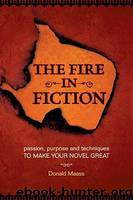The Fire in Fiction: Passion, Purpose and Techniques to Make Your Novel Great by Maass Donald

Author:Maass, Donald [Maass, Donald]
Language: eng
Format: epub
Tags: Writing
ISBN: 9781582975061
Barnesnoble:
Goodreads: 6376896
Publisher: Writer's Digest Books
Published: 2009-05-06T00:00:00+00:00
Do you believe in vampires? No, seriously. You don't, right?
Here's another question: Do you read vampire novels? Whether or not you do, a great many readers enjoy them. To do so they suspend their disbelief. They must. How do authors get them to do that?
The same question can be asked about novels in which justice is done, love triumphs, and lone protagonists save the world. In real life those things don't always happen, or at least not easily and despite the high odds posed in a well-plotted novel. Even character-driven stories such as sagas, coming-of-age novels, and women's and literary fiction present events that are not everyday occurrences. What happens in all fiction is to some degree preposterous and yet readers go along.
Or not.
Have you ever felt that a novel you were reading got ridiculous? When fiction feels far-fetched we cease to enjoy it; indeed, we may even hurl it across the room. Then again, there are those novels in which the very premise defies logic and yet we breathlessly turn the pages. Even realistic fiction can put its characters through things that would send ordinary human beings into therapy, yet we identify with those characters and praise the author's powers of observation and ability to capture the "truth" of human experience.
How do those authors pull that off? We may speak of them getting away with something, but I do not believe that any fiction writers get a free pass. When novels work, they build a feeling ofbelievability. For us to enter into the story and experience it, they must. For us to buy in we must be sold.
What, then, are the methods by which a story is made to feel real? More than that, how can we construct the high level of dramatic events that make a novel a powerful and transformative experience—and at the same time do so in a way that has our readers never doubting and even cheering all the way?
To find out what makes the impossible feel real, let's absorb lessons from some of the most outlandish stories on the shelves today: thrillers built around conspiracies, cloning, killer viruses, genetic engineering, and the supernatural.
THE SKEPTICAL READER
Are you paranoid? No, I mean seriously and deeply paranoid to the point that your friends think you're obsessed and you've wondered if you might need professional help? Do you know way too much about the grassy knoll, Skull and Bones, the Masons, Majestic 12, or MK-Ultra? If so, congratulations. You have the makings of a conspiracy novelist.
You're in good company, too. Michael Innes, Graham Greene, Don DeLillo, Richard Condon, Robert Ludlum, and Dan Brown are just a few whose conspiracy-driven novels have entertained millions. Margaret Atwood, Thomas Pynchon, Ishmael Reed, and Philip K. Dick also have given conspiracy fiction a literary pedigree.
Whether your purpose is commercial or high-minded, clearly it pays to believe that the cartoon character Pogo got it wrong when he famously declared in 1970, "We have met the enemy and he is us." Oh no, no. It's actually us against them! There's a lot to be paranoid about, too.
Download
This site does not store any files on its server. We only index and link to content provided by other sites. Please contact the content providers to delete copyright contents if any and email us, we'll remove relevant links or contents immediately.
Asking the Right Questions: A Guide to Critical Thinking by M. Neil Browne & Stuart M. Keeley(5761)
Autoboyography by Christina Lauren(5228)
Eat That Frog! by Brian Tracy(4526)
Dialogue by Robert McKee(4389)
Sticky Fingers by Joe Hagan(4188)
Journeys Out of the Body by Robert Monroe(3615)
Annapurna by Maurice Herzog(3464)
Full Circle by Michael Palin(3443)
Schaum's Quick Guide to Writing Great Short Stories by Margaret Lucke(3375)
Elements of Style 2017 by Richard De A'Morelli(3343)
The Art of Dramatic Writing: Its Basis in the Creative Interpretation of Human Motives by Egri Lajos(3061)
Atlas Obscura by Joshua Foer(2955)
Why I Write by George Orwell(2945)
The Fight by Norman Mailer(2930)
The Diviners by Libba Bray(2927)
In Patagonia by Bruce Chatwin(2922)
The Mental Game of Writing: How to Overcome Obstacles, Stay Creative and Productive, and Free Your Mind for Success by James Scott Bell(2897)
Venice by Jan Morris(2568)
The Elements of Style by William Strunk and E. B. White(2470)
